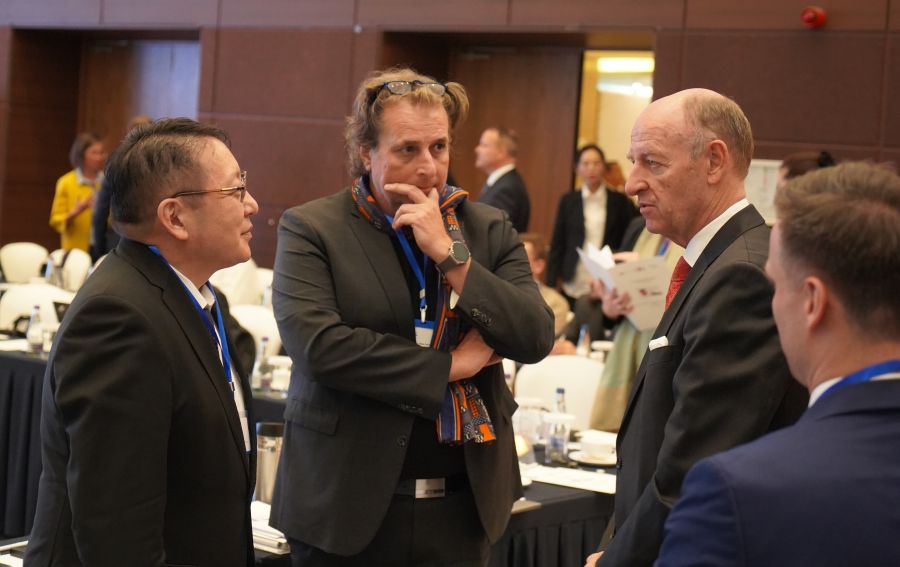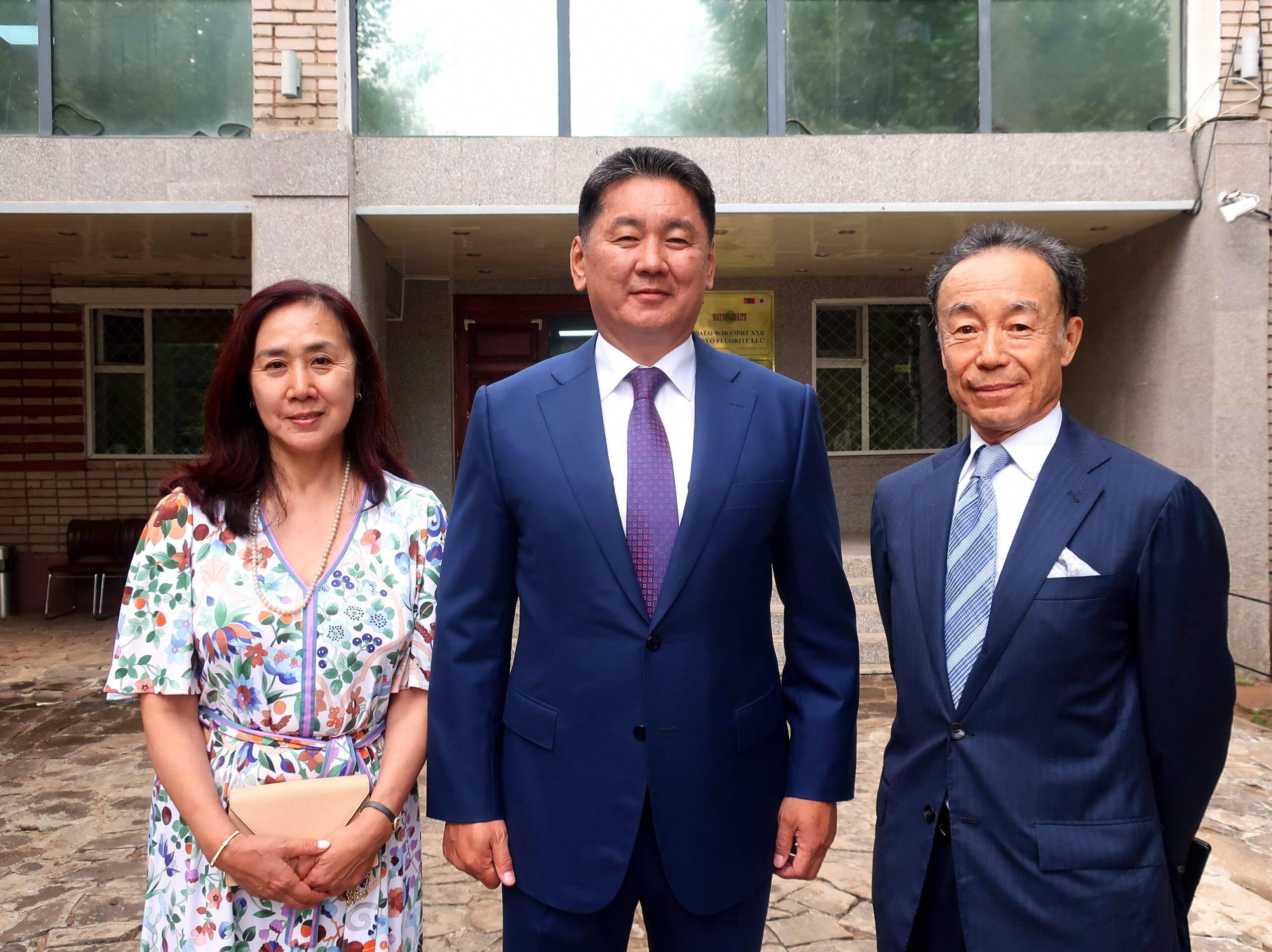The 9th Meeting of the Mongolian-German Economic Committee convened in Ulaanbaatar on June 5, 2023. The meeting was chaired by Mr.S.Narantsogt, CEO of “Erdenes Mongol” LLC, and Mr.Hans-Christoph Brumberg, CEO and Asia Regional Director of “WPD” LLC, which operates in the field of development and financing of renewable energy projects, the head of the German side of the committee.
Representatives from private enterprises and organizations of the two countries participated in the meeting and exchanged opinions on the possibilities of developing business cooperation.
We have discussed and got detailed clarification from Mr.S.Narantsogt, CEO of “Erdenes Mongol” LLC, about the issues discussed at the meeting and the results of the meeting.
-First of all, please tell us about when was the Mongolian-German Economic Committee established and what are its responsibilities.
The representatives of the meeting of the Mongolian-German Economic Committee aim to make a real contribution to the development of mutually beneficial cooperation between the two countries. The Agreement between the Government of Mongolia and the Government of the Federal Republic of Germany on “Cooperation in Minerals, Industry and Technology” was first signed in October 2011.
The Economic Committee has an important role in implementing the agreement, connecting Mongolian and German business owners, opening the doors to joint projects and programs, presenting the policies implemented by the governments of the two countries to business owners, and thus strengthening the relations between the economy and citizens of the two countries.
-What is the level of economic cooperation between the two countries?
Mongolia established diplomatic relations with Germany in 1974. Next year will mark the 50th anniversary of the establishment of diplomatic relations between the two countries.
After the pandemic, trade, and economic cooperation between the two countries have been restored, and by 2022, the trade turnover has reached 208 million US dollars. Out of this, the total export amount reached 26.0 million US dollars and the total import amount reached 182.8 million US dollars. Mongolia mainly exported food and agricultural staples and imported technical equipment, staple food products, and petroleum products from Germany.
Relations and cooperation between the two countries are rapidly developing in the defense, education, culture, environment, and humanitarian sectors.
-What issues were discussed at this 9th Meeting of the Mongolia-German Economic Committee?
More than 80 participants representing 40 entities from the mining, renewable energy, logistics, and education sectors participated in the meeting and exchanged opinions on the development of cooperation. Also, private sector enterprises and organizations showcased their prospective projects, while government ministries presented policy and legislative reforms.
-In which fields of the economy did the Mongolian side express their interest in cooperation with Germany?
Specific proposals for cooperation in the fields of minerals, renewable energy, education, transport, and logistics were made at this meeting. For example, it has been emphasized that the primary focus of our bilateral cooperation should be on facilitating German investment in the exploration, extraction, and processing of critical and rare minerals to foster a sustainable supply from Mongolia.
The two countries believe that it is possible to jointly implement large-scale projects in the mineral and industrial sectors. For example, to process iron ore and produce high-quality steel. In addition, it has discussed the possibility of increasing the investment of German companies for conveyor systems in the stripping and extraction of open-pit mines. They expressed their interest in mutually beneficial cooperation by establishing a clear direction for partnership in collaborative research, exploration, extraction, and processing of specific rare metals and rare earth elements.
-What are the solutions for renewable energy cooperation between the two countries?
Considering the persistent challenges faced by the wind power plant project over the years, it is deemed essential to present the following proposals to the intergovernmental working group as a top priority in this sector.
There is a need for cooperation between the parties in the implementation of the wind farm contract.
In addition, we noted in the conclusion of the meeting that exploring alternative solutions and technological advancements to make further opportunities through government grants and support for generating non-fluctuating electricity at the wind plants, which have been commissioned by private sector investors from Germany should be considered.
-What solutions do you see at the government level to solve the problem of the high cost of renewable energy production?
It is suggested to issue a governmental decision that promotes the establishment of a systematic framework for collecting renewable energy payments in one dedicated account or fund and use that fund only for the purpose of addressing the challenges associated with renewable energy production.
In addition, in case of building a new renewable energy station in the future, it is advisable to provide the standard technological requirements for the construction of the station in the combined form of solar and wind with an energy storage solution and ensure its implementation.
-What are the possibilities of cooperation with Germany in the field of education?
Within the framework of supporting companies investing in and operating in the mining and renewable energy, it was considered possible to strengthen the infrastructure of teaching and research laboratories in Mongolian universities and foster the advancement of specialized training programs. In particular, both parties agreed to diversify the activities of the German-Mongolian Institute for Resource and Technology in Nalaikh in the field of science and technology.
In this context, relevant institutions from both countries must collaborate to ensure that students from the German-Mongolian Institute for Resource and Technology, as well as those studying specialized professions in Germany, have the opportunity to receive training within German-invested companies operating in Mongolia.
-From the German side, they made an offer that can be implemented in the air transport sector in our country. What was their offer?
Given the vastness of Mongolia, the German side presented that it is possible to develop the general aviation sector, which is low-cost flight services with small helicopters. As it is important for the development of mining and tourism, the parties agreed during the negotiations that the civil aviation authorities of the two countries should work together to come up with specific solutions in a short period of time.
To summarize, the 9th meeting of the Mongolia-German Economic Committee concluded successfully, promoting new ideas and initiatives among the two countries’ private sector institutions, addressing the challenges faced by these institutions, and proposing viable solutions.




